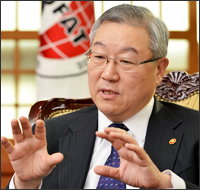Korea seeks US-China dialogue
New trilateral format comes at Japan’s cost

Foreign Affairs and Trade Minister Kim Sung-hwan gestures while speaking during an interview with The Korea Times at his office in Seoul, Monday. (Photo : The Korea Times/Shim Hyun-ch)
Foreign Minister Kim Sung-hwan said that China will be a new key partner in maintaining peace and security on the Korean Peninsula alongside the United States, adding the launch of Seoul-Washington-Beijing trilateral talks was urgent.
“South Korea, the United States and China are now key players in discussions for peace on the Korean Peninsula,” said Kim in a recent interview with The Korea Times ahead of its 62ndanniversary. “South Korea will continue to actively engage in dialogue with the U.S. and China. In the future, I think we will need to hold a Korea-U.S.-China trilateral dialogue to discuss issues of common interest.”
The minister’s idea of forming a new framework is based on the point that they are the de facto directly-concerned nations concerning security matters on the peninsula.
Although no security agreements have been signed, Japan had previously been considered a key ally for South Korea along with the U.S. in security issues.
“Needless to say, the U.S. and China are the two most important countries for Korea. We are striving to continue to develop our alliance with the U.S., and our strategic cooperative partnership with China.”
Meanwhile, Kim cautioned that the new trilateral framework will be possible only in the context of the North Korean issue and does not mean to totally neglect the old three-way cooperation between Korea, the U.S. and Japan.
“The Korea-U.S.-Japan cooperation has its own role… but the Korea-U.S.-China relationship will become more and more important in the future,” said Kim. “To sum up, the two Koreas should engage directly in dealing with issues on the Korean Peninsula. This is the priority. After decisions are made between the North and the South, they should be guaranteed by the U.S. and China, and after that, by Russia and Japan, in that particular order.”
The Korean War armistice agreement was signed in 1953 between Pyongyang, Washington and Beijing. In turn, the North still insists on direct talks with the U.S. for the replacement of the armistice with a peace agreement while neglecting Seoul.
“However, the time has changed and now the South has the initiative on the Korean Peninsula.”
When the armistice agreement was reached, Seoul has delegated its power to Washington.
The two Koreas currently remain technically at war.
Kim also pointed out that, despite ongoing rivalry between the U.S. and China, they share the same goal of maintaining peace and stability on the Korean Peninsula.
“I am of the view that Korea’s relations with China and the U.S. are positive as the three countries all pursue peace and prosperity in the region,” said Kim. “It is not a matter of selecting between the two, at least in our case. We are already maintaining close cooperation on North Korean nuclear issues.”
The career diplomat also denied the allegation that South Korea will participate in the U.S. missile defense system, following an upgrade of Seoul’s missile capabilities. U.S. Defense Secretary Leon Panetta last week said that Washington is still in consultations with Seoul over the latter’s future role in a U.S.-led multi-layer global defense system.
There is a speculation that the move could push Seoul to take part in the long-term strategy of containing and encircling China together with another key ally in the region ― Japan.
“We should not take part in the U.S. system since China sees it as a threat… and it is also a matter of our sovereignty as many Koreans oppose it,” said Kim. <The Korea Times/Chung Min-uck>



















































